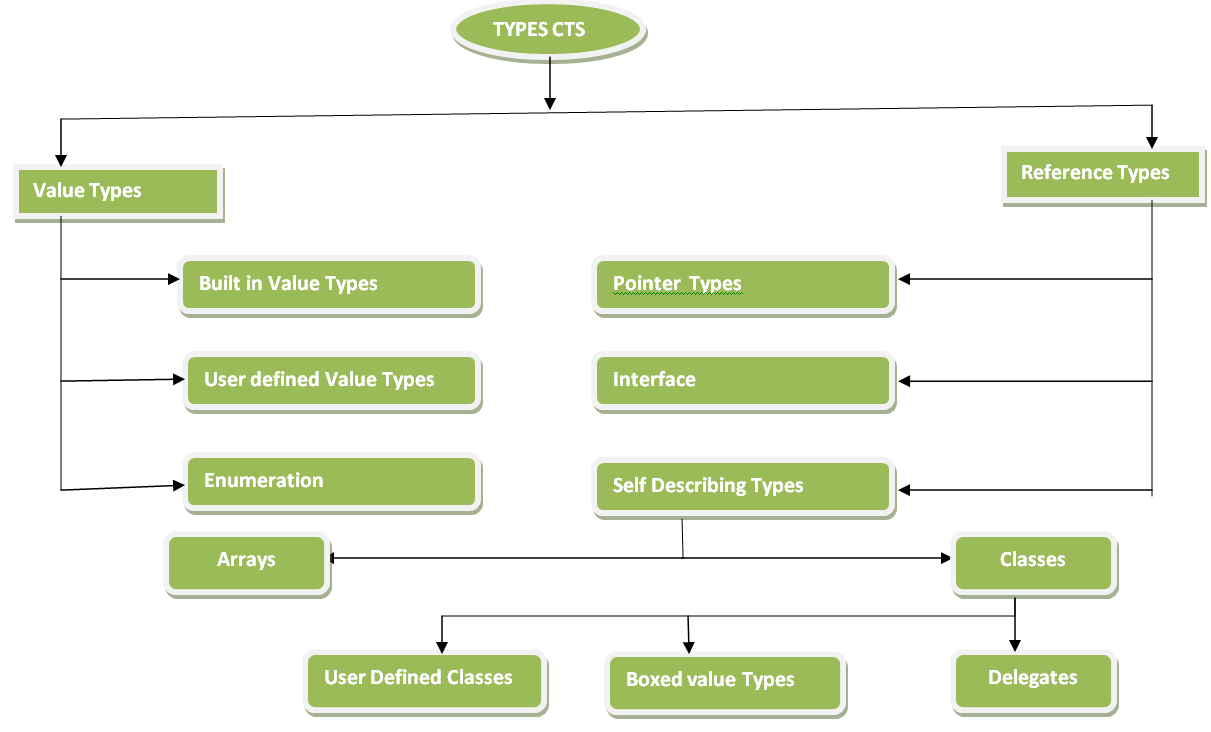Common Type System CTS in C#
The CTS is an integral part of the runtime and helps to support cross language communication.CTS specifies
certain guidlines for declaring,using and managing types at runtime.
The functions performed by the CTS are :-
- Provide cross language communication
- Type Safety
- High performance execution of code by estabilishing a framework
- Supports an object oriented model for implementation of different programming languages
- Specifies guidlines for different languages, ensuring the interaction between their objects
- Supports primptive data types,such as Boolean,Byte,Char,and Int32 that are used in ,the process of development of an application
CTS can be classified into two datatypes :-
- Value Type
- Reference Type
Value Types in C#
Value Types :- The Value Type variables are managed by CLR and can store their values in either the Stack or Heap Memory.The garbage
collector manages the memory allocated to these types by releasing the memory space of variables when they are no longer in use.An instance of
a Value Type has its value allocated on the Stack.Variables declared as value Types have their own seperate copy of data
and therefore any operation on one variable does not affect the other variables.
Value Types are variable that can be assigned a value directly.They are derived from System.ValueType and have a special behaviour
in CLR. The value types and their contents are stored at the same location in memory.
The default values of Value Types are stored on Stack.
These are few Value Types :-
- Bool
- Byte
- Char
- Decimal
- Double
- float
- int
- long
- Sbyte
- Short
- uint
- ulong
- ushort
Reference Types :- C# also provides types that are passed by references to calling functions, known as reference types.
Variables that refers to the Objects,store the reference of the data not actual data.
In reference types, any changes made in the new copy midify the old copy to which object is
referenced. The reference types use heap to store the references ,instead of the actual data.
C# provides some built in reference types which are follows :-
Dynamic Type :- Performs the type checking of the dynamic type variable at runtime
instead of compile time. You can add any type of value in the dynamic type variable.
For Example
Dynamic dynObj=10;
Object Type :- Object Type enables you to assign values of any type to the variables of Object Type. Object is an
alias for the predefined System.Object class.
The Object Type is the ultimate base class for the other types in Common Type System,such as value types,reference types,
predefined types and user-defined types. All the types are Derived directly or indirectly from the Object Type.
What is Boxing ? When a Value Type is converted into the Object Type (reference type) , this process is known as Boxing.
For Example
Object X;
X=35; Here we assign X a value with 15 ,is called the Boxing.
What is Unboxing ? When a Object Type is converted into the Value Type , this process is known as Unboxing. The Reference
Type can be declared using any of the keywords like Class,Interface,Delegates etc .The Reference Types also
use built in reference types like Dynamic,Object,String .
Hierarchical Representation of Data Types
